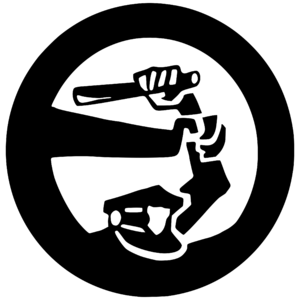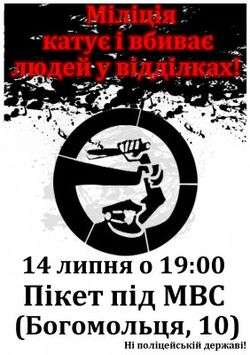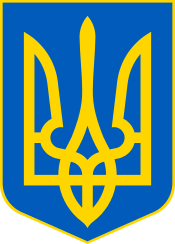No to police state
"No to police state" campaign - All-Ukrainian civil campaign against police brutality caused by the death of 20 years old student Igor Indylo in police precinct of Shevchenkivskyi District, Kiev. This campaign demanded to conduct proper investigation of the death of Indylo, to punish men guilty in his death and other high-profile cases.
| Civil campaign "No to police state" Ukrainian: Громадянська кампанія "Ні поліцейській державі" | |||
|---|---|---|---|
 image used by activists during the campaign | |||
| Date | since May 2010 | ||
| Location | |||
| Caused by | The death of student Igor Indylo in police precinct of Shevchenkivskyi District, Kiev | ||
| Goals | To force government to conduct proper investigation and punish guilty | ||
| Methods | protests | ||
| Status | unfinished | ||
| Parties to the civil conflict | |||
| |||
| Lead figures | |||
| |||
The death
Igor Indylo died in police precinct of Shevchenkivskyi District, Kiev on May 18, 2010. Civil activists and journalists considered that a murder committed by constables Sergiy Pryhodko and Sergiy Kovalenko. This death caused big public attention and start of civil campaign "No to police state". As for January 2015 investigation and court process are still going on. Court have not determined the cause of death yet.
Timeline
May 17
- 18:00 - Igor Indylo with his friend Volodymyr Lesenko started celebrating the birthday of Indylo in dormitory of Kyiv Professional Pedagogical College. According to the statement of Lesenko they have drunk a liter of moonshine, but Lesenko confuses in the testimony.
- 18:20 - the neighbour of Indylo claimed seeing him lying on the floor in the corridor in that time.
- 20:00 - near the dormitory Indylo argued with security guard Dmytro Hvorostyna and constable Sergiy Pryhodko.
- 20:15 - Indylo (with no assistance) and Lesenko voluntarily sat in the constables car and went to the police precinct of Shevchenkivskyi District.
- 20:20 - the commandant of the dormitory Zinaida Fedoryna phonecalled to Pryhodko and asked to release Igor. Pryhodko refused.
- 20:38 - Indylo, Lesenko and Pryhodko arrived at the police precinct. According to forensics Indylo had approximately 3 ppm of alcohol. But surveillance camera record shows that Indylo walks normally, not like a drunk man.
- 21:00 - Indylo "fell" for the first time in the precinct. the cause of the fall is unknown. Policemen claim that he became unconscious. The ambulance was called for him.
- 21:49 - surveillance camera recorded Pryhodko dragging Indylo to the room for administrative detainees.
- 22:11 - Indylo started moving after 20 minutes of laying of the floor with no moves. If he was drunk, as policemen claimed, he would sleep soundly. But if injuries are putting pressure on the brain, such behavior is possible.
May 18
- 00:30 - constable came back to the dormitory. He told that Indylo is sleeping.
- 01:23 - Indylo fell from the bench. This caused a closed head injury with fractures of the skull base.
- 03:00 - Indylo did not move. According to forensics he dead approximately in this time.
- 04:51 - Indylo was noticed by policeman Oleksiy Zhizherin. He turned Indylo on the back with his foot. He realized that Indylo is sick and gone to call an ambulance.
- 05:14 - paramedics stated that Indylo is dead. They said that the cause of death was choking with his vomit.
- 05:30 - policemen woke students in dormitory and took them to the precinct to take statements from them.
- 06:00 - police management held and emergency meeting.
Versions
Police
At the first days police made no statements.[1] But media attention forced police to do a statement on May 26. The Chief of police precinct of Shevchenkivskyi District Petro Miroshnychenko announces: "We know that Indylo have fallen for three times. First - he was seen laying on the floor in dormitory. Second - he has fallen in the presence of his friend. Third - he has fallen from the bench in police precinct from the height of approximately half of meter."
Ukraine Parliamentary Commissioner for Human Rights
On June 2 Ukraine Parliamentary Commissioner for Human Rights Nina Karpachova stated that the death of Indylo is murder and police will try to "hush up" the case.[2]
Society and media
Activists of "No to police state" campaign pointing out controversial facts of Indylos death accused policemen of the police precinct of Shevchenkivskyi District in murder.
On June 18 during press conference in Kiev journalists announced results of their own investigation. Journalist Dmytro Gnap announced that most likely Indylo was pushed hardly, he hit the wall and became unconscious because the right half of his brain crashed. Brain hemorrhage started and lasted for nearly 7 hours. Then Indylo was dragged to the room for administrative detainees and left to die. Dmytro Gnap also announced that Indylo was not tortured and other journalists, who took part in investigation, agreed with him.
MP Yuriy Karmazin announced that he does not believe injuries of Indylo to be accidental. According to his experience in law enforcement such injuries can not be caused by the fall to the floor. Journalist Olena Bilozerska and human rights activist Tetyana Yablonska did not believe that Indylo was not tortured too.
Goals
According to activists their goal is to punish guilty of all high-profile cases of police brutality. Among these cases are:
- The death of Igor Indylo in police precinct of Shevchenkivskyi District in Kiev which caused the campaign.[3]
- Beating activist protecting Park of Maxim Gorky in Kharkiv from ruining. Police beat activist by themselves or did nothing to stop other men beating activists.[4]
- The death of Dmytro Yashuk in police precinct of Sviatoshynskyi District in Kiev. He was found hanged. Police claimed that he hanged himself, but society was convinced he was hanged by somebody.[5][6]
- Beating Denis Malenko, Andriy Bondar and underage Sergiy Ivanchenko in police precinct of Leninskiy District in Kirovograd.
- Beating two journalists Dmytro Stoykov and Yevgen Safonov by policemen in Zaporizhia. Guilty policeman had only a reprimand for that.
- Systematic obstruction of meetings and protest actions by police.
In June 2010 demand of activists became more global. They started demanding lustration and reform of police, amendments to laws. Activists demanded to:
- Strengthen punishment for misconduct, especially for tortures.
- Expand the powers of Ukraine Parliamentary Commissioner for Human Rights, especially concerning prevention and combating of torture by policemen.
- Reestablish public councils in all territorial divisions of Ministry of Internal Affairs and to establish transparent mechanisms for public access to monitor the work of police.
Timeline of campaign

- 2010
- May 26 - activists held an action against beating of activist protecting Park of Maxim Gorky in Kharkiv from ruining by the police. The same day the story about the death of Indylo was shown on the news on TV channel 1+1.[7] The story told that students claim that police puts a pressure on them to force them witness that Indylo participated in a fight before police came and sat in the police car already beaten and with his head injured. Also it told that on night from 17 to 18 of May ambulances came to the precinct four times and emphasized that police made no statements about the death of Indylo.
- June 1 - the first all-Ukrainian protest action against police brutality titled "We don't want to fall - we don't want to die" took place. Protesters demanded to replace all management of police precinct of Shevchenkivskyi District, to appoint a parliamentary commission to investigate all recent high-profile cases of police brutality and to publish results of the investigation of the death of Indylo. Protesters promised to repeat protest action in case their demands will not be obeyed. The action took place in 18 Ukrainian cities: in Kiev near the police precinct of Shevchenkivskyi District, in Kharkiv, Donetsk, Lviv, Lugansk, Zhytomyr, Khmelnytskyi, Rivne, Kirovograd, Ivano-Frankivsk, Ternopil, Uzhgorod, Yevpatoria and other near regional offices of Ministry of Internal Affairs.[8]
- June 4 - activists held an action titled "Police is illegal" in Kiev and Lviv which was caused by another beating of activist protecting Park of Maxim Gorky in Kharkiv. In Kiev it took place near the building of Ministry of Internal Affairs. Also there was a flashmob to support Kharkiv activists on Maidan Nezalezhnosti in Kiev.
- June 10 - the second all-Ukrainian protest action against police brutality took place in 12 cities: Kiev, Donetsk, Zaporizhia, Simferopol, Kherson, Poltava, Zhytomyr, Khmelnytskyi, Rivne, Ternopil and other.[9]
- June 14 - the round table titled "Police and society: opposition or understanding" was held in Lviv with activists and Lviv Oblast police management participating.
- June 18 - the press conference "New murders in Kiev precincts: versions of police and parents of victims" took place in Kiev. Police representative Volodymyr Polishuk, journalists and others announced their versions of recent high-profile deaths in police precincts of Kiev - the death of Igor Indylo in police precinct of Shevchenkivskyi District and the death of Dmytro Yashuk in police precinct of Sviatoshynskyi District. Police representative denied police being involved in deaths of boys. But journalists, MP Yuriy Karmazin and relatives of Dmytro Yashuk announced results of their own investigations and controversial facts in police version.
- June 24 - activists organized a procession from Square of Contracts to Mykhailivska Square. After it activists performed a theatrical performance titled "The kitchen of death". Apart from demands to punish guilty in the deat of Indylo and in other high-profile cases of police brutality the new more global demands appeared - to strengthen punishment for misconduct, especially for tortures by policemen, to expand the powers of Ukraine Parliamentary Commissioner for Human Rights, to reestablish public councils in all territorial divisions of Ministry of Internal Affairs, to establish transparent mechanisms for public access to monitor the work of police and other.
- June 26 - the residents of Lubny particioated in protest action against police brutality titled "Let's protect Lubny residents from Lubny police" organized by the mayor Vasil Koryak. It was caused by recent beating of a boy by police and systematic misconducts and brutality of local police.[10]
- June 28 - the flashmob against police brutality took place on Sofiivska Square in Kiev. People laid down on the pavement and their body contours were marked with a chalk like it is usually done with corpses.
- July 14 - another protest action took place near the building of Ministry of Internal Affairs in Kiev. It was caused by that policemen who killed Indylo were not punished, policemen beat journalists in Zaporizhia had too soft punishment, activists protecting Park of Maxim Gorky in Kharkiv were arrested, illegal obstructions to protest actions and journalist activities by police.
- July 22 - the protest action against police permissiveness titled "Enough telling lies!" took place near police precinct of Sviatoshynskyi District in Kiev. Relatives and friends of Dmytro Yashuk took part in it. Protesters demanded to do a proper autopsy of Dmytro Yashuk body and to tell them the names of suspects of this case.
- September 8 and 9 - the solidarity actions with Kharkiv activist arrested for distribution of leaflets took place in Kiev and Lviv.
- September 30 - the press conference about police brutality took place in Kiev. Police was represented by Volodymyr Polishuk, victims were represented by relatives of Dmytro Yashuk, Kharkiv Human Rights Protection Group and members of public initiative of Sviatoshynskyi District residents.
- from 2011
Links
References
- A student died in police precinct in Kiev. Police remains silent - UNIAN (in Ukrainian)
- Ukraine Parliamentary Commissioner for Human Rights announced that the deat of student in police precinct in Kiev is a murder - TSN (in Russian)
- How did Igor Indylo die - Ukrayinska Pravda (in Ukrainian)
- Park of Maxim Gorky case
- A hanged boy was found in police precinct in Kiev - Ukrayinska Pravda (in Ukrainian)
- Arrested boy found hanged in police precinct in Kiev - TSN (in Russian)
- The murder of a student - TSN (in Ukrainian)
- «Let's stop police permissiveness!»: protest action near Lviv Oblast regional office of MIA Archived 2014-11-28 at the Wayback Machine - ZIK (in Ukrainian)
- No to police state protest action - 5 Kanal (Youtube) (in Ukrainian)
- What is happening in Lubny? - Den (in Ukrainian)
